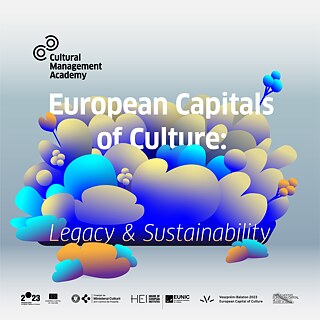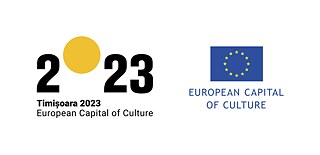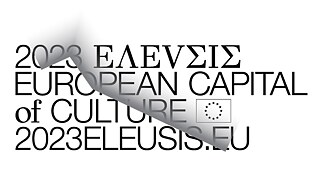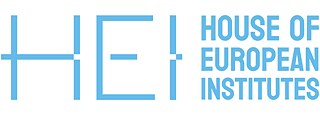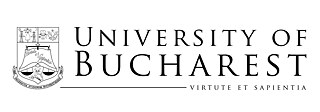Cultural Management Academy
EUNIC – EU National Institutes for Culture – in partnership with the European Capitals of Culture 2023: Timișoara (Romania), Elefsina/Eleusis (Greece), and Veszprém-Balaton (Hungary) is pleased to announce an Open Call for participation in the 7th Cultural Management Academy programme.
CMA is a professional programme designed to improve capacity building and to support the cultural operators in the region to develop an environment of sustainability in the cultural field, encouraging the resilience of the sector by supporting the development of co-created transversal and transnational projects.
CMA is a professional programme designed to improve capacity building and to support the cultural operators in the region to develop an environment of sustainability in the cultural field, encouraging the resilience of the sector by supporting the development of co-created transversal and transnational projects.
Thematic focus 2023
Continuity and transformation of cultural practices beyond the European Capital of Culture year - Resource awareness and networked-creativity as Legacy generators
For some organizations, the year of the Cultural Capital is a booster; for others it marks the end of consistent and ample projects and events. However, both can look at 2023 as a transformative moment for their managerial actions if reflection and learning occur.
Cultural practices are one of the legacies of the ECoC contexts. Events, projects and discourses moulded how we understand and experience the arts and culture, but also shaped organizations, professionals, connections and audiences. The results appear not only in the public sphere but also in the relationships between people and innovative ways of strengthening the development of know-how abilities in the cultural field.
To provide continuity, we will have to make these practices and results visible, by acknowledging and raising awareness about them and the process that leads to their creation and development. Then, we need to build further through strategic action, focused on sustainability and network consolidation. The group of operators that is driving the cultural programme is flaring with activity. The engine is contained in individuals and organizations, and not in the extra-funding available - that would not be able to create anything by itself.
Efforts of building practices in audience development, accessibility, generation of revenue, encouragement of diversity and dialogue developed during the preparation years become impactful activities, often through trial and error and sustained effort. These struggles came as a decanting process and with some impossible-to-ignore costs - resources invested, not only material, but also personal and psychological, which are extracted from the people powering the scene. In this sense, one needs to ask: what kind of practices are worth sustaining and how?
The methods and tools of cultural management practices need to be conceptualized in order to be understood, shared and learned. By mapping those practices which together yield positive social and civic resources of those involved and simultaneously don't exhaust them, we can compare and confront different approaches to cultural management. Resourcefulness and innovation fuel a long road ahead, which can become much broader if traveled creatively. But can this be a substitute for ultra-funding? If yes, how?
There is an attempt to capitalize on the momentum through the commercialization of culture, where audience development begins to be understood as better marketing. At the same time, political and administrative drivers often bend the programme towards large cultural institutions or elite private players. Also, artistic and innovative nests of practitioners, or nomadic opportunists are hunting down funding to secure their success. In this context, cultural management seems to function mostly as a pragmatic implementation function, an instrument on all sides. It struggles to obtain the desired impact and change promised by the ECoC in more cultural, civic and social areas.
In this year's edition of the CMA, we aim to explore different types of practices and their support for creation, their sustainability and their ability to self-perpetuate with the prospect of diminished funding, after the Title year, but with continued dialogue, learning, and network design. We are looking for existing communities of sustainable practices and networks that develop such approaches and focus on working with them on these subjects. In addition, we plan on asking the following questions:
- What is common between the ECOCs in terms of sustainability?
- How to generate alternative funding and material / human capabilities?
- How to connect networks? Who knows who… and what is, really, a partnership?
- What are the ECOCs introducing for community engagement and participatory process?
- How to sustain and develop decentralized cultural practices that proved optimal in terms of results and resources, and are developed by small local and independent operators, after ECOC?
Participants will be encouraged to reflect on their own practice and refer to other existing practices in the ECoC cities to have a critical approach and to identify strategies, methods, tools and resources that can be sustained via innovative cultural management practices, whatever future context might be.
CMA 2023 offers the opportunity to learn from international trainers and develop new skills, to share ideas that will contribute to the development of the cultural sector through a continuous process of reflection on the ECoC journey and the road ahead.
About
CMA is a professional programme designed to improve capacity building and to support the cultural operators in the region to develop an environment of sustainability in the cultural field, encouraging the resilience of the sector by supporting the development of co-created transversal and transnational projects. Furthermore, the programme generates cross-sectorial innovation, connecting culture with a heterogenous landscape of related fields like creative industries, digital technologies, humanities, sciences etc. CMA will focus on bringing together cultural operators from the independent and public sector in order to find the best solutions for sustainability of the cultural field.The programme follows the guidelines established by the Cultural Management Academy (CMA) in the previous six regional editions, this time focusing on the ECoCs 2023: Timișoara (Romania), Elefsina (Greece) and Veszprém (Hungary).
Organizers and Partners
CMA 2023 is a project by EUNIC Romania in partnership with EUNIC Greece, EUNIC Hungary and the European Capitals of Culture 2023: Timișoara (Romania), Elefsina/Eleusis (Greece) and Veszprém-Balaton (Hungary).
EUNIC – European Union National Institutes for Culture – is Europe’s network of national cultural institutes and organizations, with 36 members from all EU Member States and associate countries.
Other partners of the project:
- University of Bucharest - Faculty of Political Science & Centre for International Cooperation and Development Studies
- Centrul de Proiecte Timișoara
- HEI: House of European Institutes
